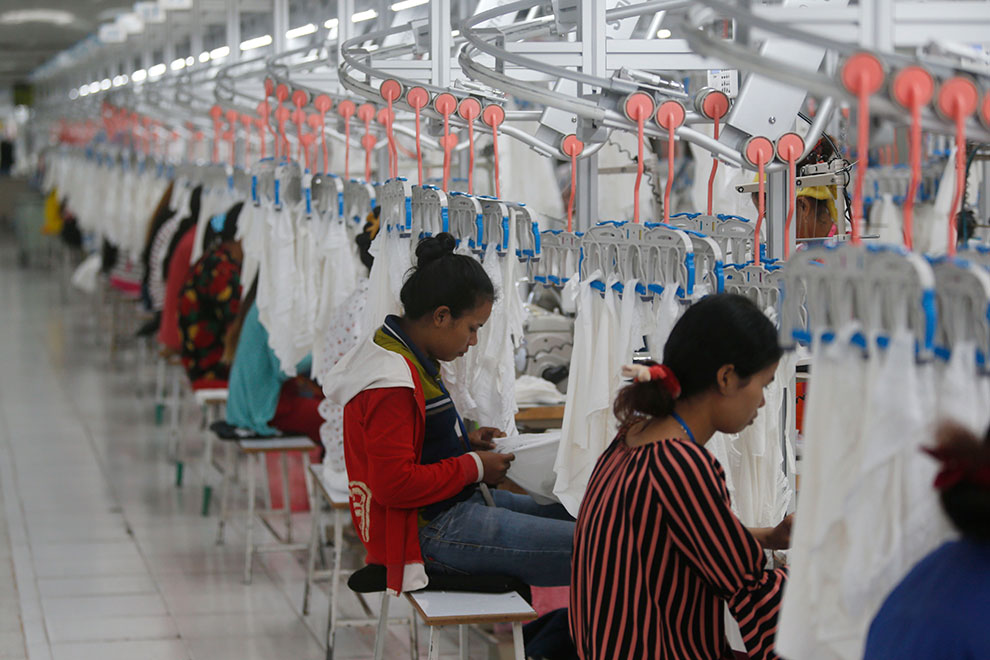Garment manufacturers this week lobbied for more cost-saving policies to offset the rise in the sector’s minimum wage.
Addressing the Commerce Ministry’s 2020 “goal-setting” conference on Tuesday, Garment Manufacturers Association in Cambodia (GMAC) chairman Van Sou Ieng said companies were looking for the government to introduce policies that would help them cut expenses.
“We’ve seen rapidly rising costs, which require compensatory savings in other areas, like productivity improvements and reduced business operating costs,” Sou Ieng said at the conference, which was presided over by Commerce Minister Pan Sorasak.
Manufacturers also needed policies to expedite faster shipping and business operations to respond to buyers’ demands, Ieng added.
“With more buyers requesting shorter lead times, our limited local supply chain requires policies in support to address it.”
In September, unions, employers and the government agreed to a $8 increase in the minimum wage from $182 to $190 starting in January. Earlier this year, the government has also introduced cost-saving measures such as reducing the number of public holidays from 28 to 22 and streamlining customs procedures.
The sector faces several challenges in the year ahead, however, with duty-free trade to Europe in peril as the EU reviews its “Everything But Arms” (EBA) deal with Cambodia over political and human rights concerns. A final decision is due in February, and could cost the country as much as $654 million in exports if suspended, according to a World Bank estimate.
China’s economy could also be facing a slowdown, and Britain’s planned exit from the EU could also add to the global economy’s headwinds.
Sou Ieng praised the Commerce Ministry’s efforts to ease doing business in the country in light of the upcoming challenges, including joint lobbying efforts with GMAC to woo buyers in the EU and Hong Kong, workshops on the Registered Exporter System that aims to cut down on trade procedures, and better monitoring of workplace conditions.
“To an acceptable extent, the ministry has simplified its working procedures, modernized its methods, and reduced costs and time,” Sou Ieng said. “This has helped GMAC members in a time of great challenges.”
Echoing a common ruling party expression, he added that continued peace, political stability and social order, together with constant reform and innovation in the business and investment environment, would help Cambodia pursue becoming an upper-middle income country by 2030 and high income country by 2050.
Those goals, frequently cited by Prime Minister Hun Sen, would require income growth of more than 9.1 percent a year from the 2018 GNI per capita of $1,380 to the current upper-middle income cutoff of $3,956, based on World Bank figures.
For some unions, however, the talk of reducing costs created concerns that such policies would cut into workers’ incomes.
Pav Sina, the president of the Collective Union of Movement of Workers, said the industry should recognize that wages were rising not just in Cambodia but in competitor nations as well.
Many of the other challenges facing the sector — such as the U.S.-China trade war — affected the economy globally, and was not a concern specific to Cambodia, he said.
“The current wages of our workers in Cambodia is not appropriate yet, because the government cut public holidays, and landlords are allowed to increase rents and water and electricity rates,” Sina added. “Foods and goods at markets are increasing too, so this wage can not support workers’ livelihoods yet.”
Ath Thorn, president of the Cambodia Labor Confederation, agreed that the minimum wage still wasn’t enough, and called for the government to control prices at the market.
“The costs of all goods are still increasing, so if the government wants workers to be able to live suitably, they must guarantee that [the price of] goods at the market do not increase,” Thorn said.
He added that the government should make efforts to retain the EBA deal with the EU, and improve the fairness and transparency of garment factory inspections.
Chin Sokkea, 35, a garment factor worker in Phnom Penh, said that at current prices for food, rent, water and electricity, she would need at least another $10 increase in the monthly minimum wage to be comfortable.
“I think that if the government increased it to over $200, our workers’ living would be appropriate,” Sokkea said.
Seang Thai and Heng Sour, spokesmen for the ministries of commerce and labor, respectively, could not be reached for comment.
Published On : 20-12-2019
Source : Camboja News

